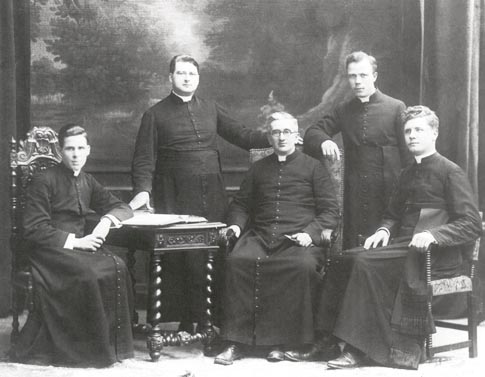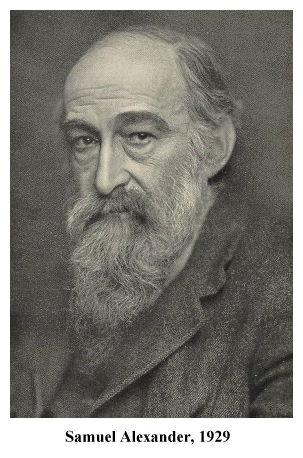
AnthonyFlood.com
Philosophy against Misosophy

Fulton J. Sheen (left) with colleagues at the University of Louvain, circa 1921

Samual Alexander
1859-1938
From Fulton J. Sheen, Treasure in Clay: The Auto-biography of Fulton J. Sheen, Doubleday & Com-pany, 1980, 25-28. Impromptu, a young doctoral student publicly subjected to a concise internal critique the system of a misosopher who basked in all the glory the academic world had to give. The title is mine.
Anthony Flood
March 5, 2013
Truth versus Novelty
Fulton J. Sheen
After two years of graduate studies at the university [Catholic University of America], I felt that I did not have a sufficiently good education to merit the degree of Doctor of Philosophy. I confided my worries to one of the professors, who said, “What would you like to have in education?” I said, “I should like to know two things—first, what the modern world is thinking about; second, how to answer the errors of modern philosophy in the light of the philosophy of St. Thomas.” He said, “You will never get it here, but you will get it at the University of Louvain in Belgium.”
In September of 1921, I left for Louvain, Belgium, and entered the School of Philosophy. My brother Tom left with me to study medicine at the same university. Regardless of how long I live, I will never be able to express the depth of my gratitude to this great university for the brilliance of its teaching, the inspiration of its leadership and the development it gave to the human mind. There were no optional or elective course—every course was required. So we had to learn metaphysics, experimental psychology, cosmology, Aristotle, modern space and time; these courses were part of the curriculum for all doctoral candidates. Everything contemporary was stressed in every area of knowledge. Even the professors of the Medical School gave us advanced courses in science. But along with being up-to-date, we were drenched in Aristotle, Plato and the ancients and immersed in the philosophy of Thomas Aquinas. The way the professors handled Aquinas he did not belong to the Middle Ages; he was our contemporary. No assigned reading was ever given, but it was always assumed that any book which a professor suggested to be read could be brought up on the final oral examination.
The most brilliant professor I had was Dr. Leon Noel, whose last name was the same as his first, if spelled backward. One course he taught was on the philosophy of Bergson, who was then the dominant French thinker. Another course was on American pragmatism. On one occasion he called me into his office and said: “Have you read the Gifford Lectures of Dr. [Samuel] Alexander?” I told him that I had not. He said: “Well, they have already been published for at least thirty days. [They were published in 1920.—A.F.] I advise you to read both of those volumes, and then go to the University of Manchester in England and then consult with Dr. Alexander.” Dr. Alexander had won a medal from King George for his philosophical treatise on Space, Time and Deity, his thesis being that deity is evolving.
I asked Dr. Alexander if I might be permitted to follow one of his courses. I do not remember if he said: “It is on Kant” or “It is just cant,” but in any case, he refused. He did invite me back to tea that afternoon. When I went to the building at the appointed time, I found a sign outside: “This afternoon at tea time, Dr. Alexander will debate Dr. Sheen of the University of Louvain.”
I did not yet have my doctorate from the University of Louvain, nor was I qualified to represent the university. But a tea table was prepared in the middle of the room for Dr. Alexander and myself. Hundreds of students sat around at various tea tables to listen to the discussion Dr. Alexander began: “Well, what would you like to know?” I realized, for the first time, what it must be like to sit at the feat of Divine Omniscience. I said: “You do not believe that God is Infinitely Perfect, do you?” He said: “Have you read my books?” I said: “Yes. I have read them twice.” “Well,” he said, “if you ever read them with any degree of intelligence, you would know that I believe that God is perfect.” I said: “May I explain to you your view as I understand it?” I then explained that Dr. Alexander’s position seemed to me to be that God was an urge, or nisus, one level above the present level of evolution. “When there was only Space-Time, God was a chemical; when chemicals came into being God was the ideal of plant; when plants came into the universe, God was the ideal state of an animal; when there were animals God was the ideal state of man; now that there is man, God is an angel. Someday we will reach that state. God will keep moving ahead as the Urge of the universe.” And he said: “Yes, that is my theory; you have understood it perfectly.” I said: “Well, Dr. Alexander, your God is not perfect: He is on the way to perfection. A Perfect God would be One Who has at each and every moment of His Being the fullness of perfection.” “I’ve never had that put to me that way before,” he said. I asked him if would be interested in reading the philosophy of Thomas Aquinas. “No, I would not be interested because you become known in this world not through Truth, but through novelty, and my doctrine is novel.”